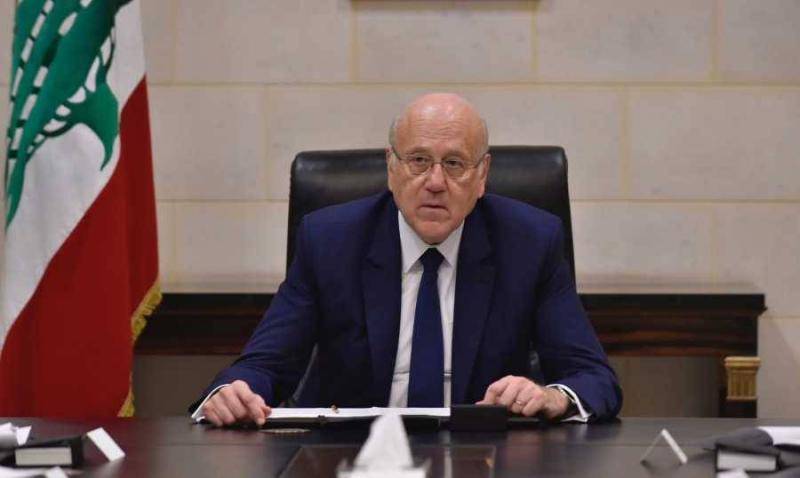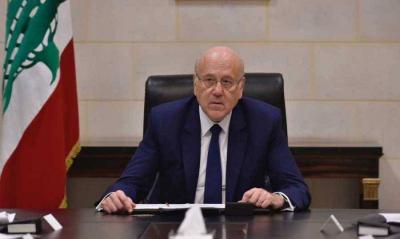During a meeting of the Foreign Affairs Committee, the MPs were surprised by a notable stance from caretaker Prime Minister Najib Mikati regarding separating the southern front from the Gaza war and neutralizing it, as the situation can no longer bear further destruction and devastation. Mikati expressed sorrow over the massive destruction in the southern villages and towns, stating that circumstances cannot continue as they are. He pointed out that France and the American mediator Amos Hochstein will revisit the idea of halting support for Gaza from the south, especially since this war does not seem likely to end soon, according to "Nidaa al-Watan."
The meeting, which was intended to address the file of Syrian refugees and to review the government’s plan to present at the upcoming meeting in Brussels next month, turned into a discussion on the ongoing war in the south. MPs from the Lebanese Forces and the Free Patriotic Movement expressed their views on the need to stop this war to avoid a broad Israeli war on Lebanon. Notably, Mikati's shift in position was surprising, as he extensively discussed the damage and devastation inflicted on southern towns due to Israeli shelling, which exceeds Lebanon's capacity to compensate the citizens. Equally surprising was his proposal to separate the south from Israel's war in Gaza and halt support operations launched from the south, which contradicts his previous declarations that the war in the south cannot end without stopping the war on Gaza.
During the meeting, Mikati hinted that France and the United States would revisit the principle of separating the fronts between Gaza and Lebanon. Mikati's comments drew objections from Hezbollah MP Ibrahim Mousawi, who rejected aligning Lebanon's timing with U.S. interests. He told the Prime Minister that the stance should be based on our national sovereignty and strategic interests, setting our clock to our national and pan-Arab interests, rather than to the words of Hochstein and others who seek to meet Israeli demands and protect its interests during their visit to Lebanon.
Hezbollah senses a significant intimidation campaign against the Lebanese state initiated by the government, attempting to pressure for a halt to the confrontation in the south between it and Israel, especially since it cannot restore settlers to the northern borders, which have been affected by a disrupted summer tourism season and halting essential industries, as well as the military exhaustion of its army. Mikati, returning from France, seemed to have a different approach. Relating to his visit to France, Mikati's remarks were interpreted as a synthesis of what he was informed during his meeting with French President Emmanuel Macron, which French Foreign Minister Stéphane Sigourney would carry to discuss the separation of the southern front from Gaza under the threat of war.
Reliable sources indicate that if the French envoy's visit takes place, its aim would be to present an offer separating what is happening in Gaza and what will occur in Rafah from the southern front, along with a new formula for implementing Resolution 1701. Diplomatic circles do not rule out that the French position is coordinated with the United States, aiming to gauge the possibility of discussing pathways with Hezbollah in exchange for Israel committing to withdraw to the agreed-upon land borders after pledging to cease its aggression against Lebanon.
The information continued that France, alongside U.S. envoy Amos Hochstein, would seek to pressure Lebanon to safeguard it from a potential Israeli strike whenever the Israeli Prime Minister fails to achieve his goals in Rafah. For this purpose, it is noted that what is being proposed behind the scenes does not relate to Hezbollah withdrawing kilometers north of the Litani River but rather about repositioning and exploring the possibility of establishing a new formula that ends the war and ensures stability along the borders from both sides.
In response to the ongoing campaign against it, Hezbollah informed the caretaker Prime Minister that as long as the aggression on Gaza continues, Hezbollah will continue its fight against Israel. Regarding what he heard from Mikati and others regarding French and American proposals about implementing Resolution 1701 and separating the fronts, Hezbollah stated that the matter of separation is not on the agenda, even for discussion. Additionally, no serious formula has yet been presented for Hezbollah to form a position regarding it.
Any new French or American formula will be managed by the Prime Minister and the Speaker of Parliament for their stance. While Mikati expressed his views to the Foreign Affairs Committee and has begun to account for the ongoing war in the south in terms of losses, the French Foreign Minister will pass on what he has to Speaker Nabih Berri, especially regarding the point about isolating the south from the Gaza war, although the response was largely known to the relevant parties beforehand. What new developments will Sigourney bring? Will the situation in Rafah and the failure of negotiations lead to Hochstein’s visit? Is what is occurring an effort to preempt painful Israeli strikes or a swift military operation? Hezbollah prefers to postpone answering these questions until after the French envoy’s visit, which is reportedly aimed primarily at the situation in the south and then an attempt to separate the presidency from the south, while the disconnection from Gaza is firmly rejected. This represents a definitive stance without discussion, according to "Nidaa al-Watan."




